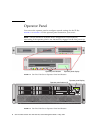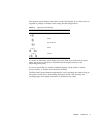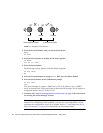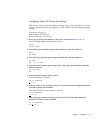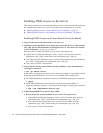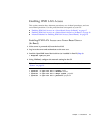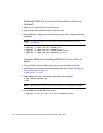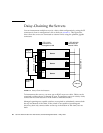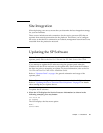
14 Sun Fire V20z and Sun Fire V40z Servers, Server Management Guide • May, 2004
Enabling IPMI Access on the Server
This section contains two alternate procedures; one for a Linux-based server and one
for a Solaris-based x86 server. Use the procedure that corresponds to your OS:
■ “Enabling IPMI Access on a Linux-Based Server (In-Band)” on page 14
■ “Enabling IPMI Access on a Solaris-Based x86 Server (In-Band)” on page 16
Enabling IPMI Access on a Linux-Based Server (In-Band)
1. Log in to the server and authenticate as the user root.
2. Install the custom openIPMI Linux kernel driver from the Sun Fire V20z and Sun
Fire V40z Servers Documentation and Support Files CD. The drivers are located
in the CD directory /support/sysmgmt/.
Browse to the OS variant installed on your server. The options are:
■ redhat/rhel3 for Red Hat Enterprise Linux, version 3 (32-bit mode uses the
architecture type “i386”; 64-bit mode uses architecture type “x86_64”)
■ suse/sles8 for SUSE Enterprise Linux, version 8 (32-bit mode uses the architecture
type “i386”; 64-bit mode uses architecture type “x86_64”)
■ suse/suse9 for SUSE 9 Professional
3. Ensure that the kernel-source RPM is already installed on your distribution by
running the command:
# rpm -qvi kernel-source
If this utility reports that the kernel-source software package is not installed, install
the kernel-source RPM that is current for your installed Linux distribution.
■ On SUSE distributions, install the kernel-source RPM by running the command:
# yast2
■ On RedHat distributions, download the current kernel-source RPM to a
temporary directory (such as /tmp). Install the package by running the command:
# rpm -ivh /tmp/kernel-source*.rpm
4. Install the openIPMI Linux kernel driver RPM.
a. Browse to the OS variant installed on your server. The options are:
■ redhat/rhel3 for Red Hat Enterprise Linux, version 3 (32-bit mode uses the
architecture type “i386”; 64-bit mode uses architecture type “x86_64”)
■ suse/sles8 for Suse Enterprise Linux, version 8 (32-bit mode uses the
architecture type “i386”; 64-bit mode uses architecture type “x86_64”)
■ suse/suse9 for Suse 9 Professional



